- Home
- Robert Harris
The Ghost Page 24
The Ghost Read online
Page 24
‘What if I don’t make any tapes?’
‘In that case, I’ll suggest to the prosecutor that she subpoenas you.’
‘Ah,’ I said craftily, ‘but what if I deny the whole story?’
‘Then I’ll give her this,’ said Rycart, and opened his jacket to show a small microphone clipped to the front of his shirt, with a wire trailing into his inside pocket. ‘Frank is recording every word down in the lobby, aren’t you, Frank? Oh, come on! Don’t look so shocked. What did you expect? That I’d come to a meeting with a complete stranger, who’s working for Lang, without taking any precautions? Except that you’re not working for Lang any more.’ He smiled, showing again that row of teeth, more brilliantly white than anything in Nature. ‘You’re working for me.’
Fifteen
* * *
Authors need ghosts who will not challenge them, but will simply listen to what they have to say and understand why they did what they did.
Ghostwriting
* * *
AFTER A FEW seconds I started to swear, fluently and indiscriminately. I was swearing at Rycart and at my own stupidity, at Frank and at whoever would one day transcribe the tape. I was swearing at the war crimes prosecutor, at the court, the judges, the media. And I would have gone on for a lot longer if my telephone hadn’t started to ring – not the one I’d been given to contact Rycart, but the one I’d brought from London. Needless to say, I’d forgotten to switch it off.
‘Don’t answer it,’ warned Rycart. ‘It’ll lead them straight to us.’
I looked at the incoming number. ‘It’s Amelia Bly,’ I said. ‘It could be important.’
‘Amelia Bly,’ repeated Rycart, his voice a blend of awe and lust. ‘I haven’t seen her for a while.’ He hesitated: it was obvious he was desperate to know what she wanted. ‘If they’re monitoring you, they’ll be able to fix your location to within a hundred metres, and this hotel is the only building where you’re likely to be.’
The phone continued to throb in my outstretched palm. ‘Well, to hell with you,’ I said. ‘I’m not taking my orders from you.’
I pressed the green button.
‘Hi,’ I said. ‘Amelia.’
‘Good evening,’ she said, her voice as crisp as a matron’s uniform. ‘I have Adam for you.’
I mouthed, ‘It’s Adam Lang’ at Rycart, and waved my hand at him to warn him against saying anything. An instant later the familiar, classless voice filled my ear.
‘I was just speaking to Ruth,’ he said. ‘She tells me you’re in New York.’
‘That’s right.’
‘So am I. Whereabouts are you?’
‘I’m not sure exactly where I am, Adam.’ I made a helpless gesture at Rycart. ‘I haven’t checked in anywhere yet.’
‘We’re at the Waldorf,’ said Lang. ‘Why don’t you come over?’
‘Hold on a second, Adam.’ I pressed MUTE.
‘You,’ said Rycart, ‘are a fucking idiot.’
‘He wants me to go over and see him at the Waldorf.’
Rycart sucked in his cheeks, appraising the options.
‘You should go,’ he said.
‘What if it’s a trap?’
‘It’s a risk, but it’ll look odd if you don’t go. He’ll get suspicious. Tell him yes, quickly, and then hang up.’
I pressed MUTE again.
‘Hi, Adam,’ I said, trying to keep the tension out of my voice. ‘That’s great. I’ll be right over.’
Rycart passed his finger across his throat.
‘What brings you to New York, in any case?’ asked Lang. ‘I thought you had plenty to occupy you at the house.’
‘I wanted to see John Maddox.’
‘Right. And how was he?’
‘Fine. Listen, I’ve got to go now.’
Rycart’s throat-slashing was becoming ever more urgent.
‘We’ve had a great couple of days,’ continued Lang, as if he hadn’t heard me. ‘The Americans have been fantastic. You know, it’s in the tough times that you find out who your real friends are.’
Was it my imagination, or did he freight those words with extra emphasis for my benefit?
‘Great. I’ll be with you as fast as I can, Adam.’
I ended the call. My hand was shaking.
‘Well done,’ said Rycart. He was on his feet, retrieving his coat from the bed. ‘We have about ten minutes to get out of here. Get your stuff together.’
Mechanically, I began gathering up the photographs. I put them back in the case and fastened it while Rycart went into the bathroom and peed noisily.
‘How did he sound?’ called Rycart.
‘Cheerful.’
He flushed the lavatory and emerged buttoning his flies. ‘Well, we’ll just have to do something about that, won’t we?’
The elevator down to the lobby was crammed with members of the Church of Latter-Day Online Traders, or whoever the hell they were. It stopped at every floor. Rycart grew more and more nervous.
‘We mustn’t be seen together,’ he muttered as we stepped out at the ground floor. ‘You hang back. We’ll meet you in the car park.’
He quickened his pace, drawing ahead of me. Frank was already on his feet – presumably he had been listening and knew of our intentions – and the two of them set off without a word: the dapper silver Rycart, and his taciturn swarthy sidekick. What a double-act, I thought. I bent and pretended to tie my shoelace, then took my time crossing the lobby, deliberately circling the groups of chattering guests, keeping my head down. There was something now so ludicrous about this whole situation that, as I joined the crush at the door waiting to get out, I actually found myself smiling. It was like a Feydeau farce: each new scene more far-fetched than the last, yet each, when you examined it, a logical development of its predecessor. Yes, that was what this was: a farce! I stood in line until my turn came, and that was when I saw Emmett, or at least that’s when I thought I saw Emmett, and suddenly I wasn’t smiling any more.
The hotel had one of these big revolving doors, with compartments that hold five or six people at a time, all of whom are obliged to lunge into it and shuffle forwards to avoid knocking into one another, like convicts on a chain gang. Luckily for me, I was in the middle of the outgoing group, which is probably the reason Emmett didn’t see me. He had a man on either side of him, and they were in the compartment that was swinging into the hotel, all three pushing at the glass in front of them, as if they were in a violent hurry.
We came out into the night and I stumbled, almost falling over, in my anxiety to get away. My suitcase toppled on to its side and I dragged it along after me, as if it were a stubborn dog. The car park was separated from the hotel forecourt by a flower bed, but instead of going round it I walked straight through it. Across the parking lot, a pair of headlights came on, and then drove straight at me. The car swerved at the last moment and the rear passenger door flew open.
‘Get in,’ said Rycart.
The speed with which Frank accelerated away served to slam the door shut after me and threw me back in my seat.
‘I just saw Emmett,’ I said.
Rycart exchanged looks in the mirror with his driver.
‘Are you sure?’
‘No.’
‘Did he see you?’
‘No.’
‘Are you sure?’
‘Yes.’
I was holding on to my suitcase. It had become my security blanket. We sped down the slip road and pulled into the heavy traffic heading towards Manhattan.
‘They could have followed us from La Guardia,’ said Frank.
‘Why did they hold back?’ asked Rycart.
‘Could be they were waiting for Emmett to arrive from Boston, to make a positive ID.’
Up to that point, I hadn’t taken Rycart’s amateur tradecraft too seriously, but now I felt a fresh surge of panic.
‘Listen,’ I said, ‘I don’t think it’s a good idea for me to go and see Lang right now. Assuming that was E
mmett, Lang must surely have been alerted to what I’ve been doing. He’ll know that I’ve driven up to Boston and shown Emmett the photographs.’
‘So? What do you think he’s going to do about it?’ asked Rycart. ‘Drown you in his bathtub at the Waldorf-Astoria?’
‘Yeah, right,’ said Frank. His shoulders shook slightly with amusement. ‘As if.’
I felt sick, and despite the freezing night, I lowered the window. The wind was blowing from the east, gusting off the river, carrying on its cold, industrial edge the sickly tang of aviation fuel. I can still taste it at the back of my throat whenever I think of it, and that, for me, will always be the taste of fear.
‘Don’t I need to have a cover story?’ I said. ‘What am I supposed to tell Lang?’
‘You’ve done nothing wrong,’ said Rycart. ‘You’re just following up your predecessor’s work. You’re trying to research his Cambridge years. Don’t act so guilty. Lang can’t know for sure that you’re on to him.’
‘It’s not Lang I’m worried about.’
We both lapsed into silence. After a few minutes the night-time Manhattan skyline came into view, and my eyes automatically sought out the gap in the glittering façade. Strange how an absence can be a landmark. It was like a black hole, I thought: a tear in the cosmos. It could suck in anything – cities, countries, laws; it could certainly swallow me. Even Rycart seemed oppressed by the sight.
‘Close the window, would you? I’m freezing to death.’
I did as he asked. Frank had turned the radio on low – a jazz station, playing softly.
‘What about the car?’ I said. ‘It’s still at Logan Airport.’
‘You can pick it up in the morning.’
The station switched to playing the blues. I asked Frank to turn it off. He ignored me.
‘I know Lang thinks it’s personal,’ Rycart said, ‘but it’s not. All right, there’s an element of getting my own back, I’ll admit – who likes to be humiliated? But if we carry on licensing torture, and if we simply judge victory by the number of the enemy’s skulls we can carry back to decorate our caves – well, what will become of us?’
‘I’ll tell you what will become of us,’ I said savagely. ‘We’ll get ten million dollars for our memoirs, and live happily ever after.’ Once again, I found that my nervousness was making me angry. ‘You do know this is pointless, don’t you? In the end he’ll just retire over here on his CIA pension and tell you and your bloody war crimes court to go screw yourselves.’
‘Maybe he will. But the ancients thought exile a worse punishment than death – and boy, will Lang be an exile. He won’t be able to travel anywhere in the world, not even the handful of shitty little countries that don’t recognise the ICC, because there’ll always be a danger that his plane may have to put in somewhere with engine trouble, or to refuel. And we’ll be waiting for him. And that’s when we’ll get him.’
I glanced at Rycart. He was staring straight ahead, nodding slightly.
‘Or the political climate may change here one day,’ he went on, ‘and there’ll be a public campaign to hand him over to justice. I wonder if he’s thought of that. His life is going to be hell.’
‘You almost make me feel sorry for him.’
Rycart gave me a sharp look. ‘He’s charmed you, hasn’t he? Charm! The English disease.’
‘There are worse afflictions.’
We crossed the Triborough Bridge, the tyres thumping on the joints in the road like a fast pulse.
‘I feel as though I’m in a tumbril,’ I said.
It took us a while to make the journey downtown. Each time the car came to a stop in the Park Avenue traffic I thought of opening the door and making a run for it. The trouble was, I could imagine the first part well enough – darting through the stationary cars, and disappearing down one of the side streets – but then it all became a blank. Where would I go? How would I pay for a hotel room if my own credit card, and presumably the false one I’d used earlier, were known to my pursuers? My reluctant conclusion, from whichever angle I examined my predicament, was that I was safer with Rycart. At least he knew how to survive in this alien world into which I had blundered.
‘If you’re that worried we can arrange to have a fail-safe signal,’ said Rycart. ‘You can call me using the phone Frank gave you, let’s say at ten past every hour. We don’t have to speak necessarily. Just let it ring a couple of times.’
‘What happens if I don’t make the call?’
‘I won’t do anything if you miss the first time. If you miss a second, I’ll call Lang and tell him I hold him personally responsible for your safety.’
‘Why is it that I don’t find that very reassuring?’
We were almost there by then. I could see ahead, on the opposite side of the road, a great floodlit Stars and Stripes, and beside it, flanking the Waldorf’s entrance, a Union Jack. The area in front of the hotel was cordoned off by concrete blocks. I counted half a dozen police motorcycles waiting, four patrol cars, two large black limousines, a small crowd of cameramen, and a slightly larger one of curious onlookers. As I eyed it, my heart began to accelerate. I felt breathless.
Rycart squeezed my arm.
‘Courage, my friend. He’s already lost one ghost in suspicious circumstances. He can hardly afford to lose another.’
‘This can’t all be for him, surely?’ I said in amazement. ‘Anyone would think he was still prime minister.’
‘It seems I’ve only made him even more of a celebrity,’ said Rycart. ‘You people should be grateful to me. Okay, good luck. We’ll talk later. Pull over here, Frank.’
He turned up his collar and sank down in his seat, and there was pathos as well as absurdity in the precaution. Poor Rycart: I doubt if one person in ten thousand in New York would have known who he was. Frank pulled up briefly on the corner of East 50th Street to let me out, and then eased deftly back into the traffic, so that the last view I ever had of Rycart was of the back of his silvery head dwindling into the Manhattan evening.
I was on my own.
I crossed the great expanse of road, yellow with taxis, and made my way past the crowds and the police. None of the cops standing around challenged me: seeing my suitcase, they must have assumed I was just a guest checking in. I went through the art deco doors, up the grand marble staircase, and into the Babylonian splendour of the Waldorf’s lobby. Normally I would have used my mobile to contact Amelia, but even I had learnt my lesson there. I went over to one of the concierges at the front desk and asked him to call her room.
There was no reply.
Frowning, he hung up. He was just starting to check his computer when a loud detonation sounded in Park Avenue. Several guests who were checking in ducked, only to straighten ruefully when the explosion turned into a cannonade of gunning motorcycle engines. From the interior of the hotel, across the immense expanse of the golden lobby, came a wedge of security men, Special Branch and Secret Service, with Lang enclosed among them, marching purposefully in his usual rolling, muscular way. Behind him walked Amelia and the two secretaries. Amelia was on the phone. I moved towards the group. Lang swept by me, his eyes fixed straight ahead, which was unlike him. Usually he liked to connect with people when he passed them: flash them a smile they’d remember always. As he began descending the staircase, Amelia saw me. She appeared flustered for once, a few blonde hairs actually out of place.
‘I was just trying to call you,’ she said as she went by. She didn’t break step. ‘There’s been a change of plan,’ she said over her shoulder. ‘We’re flying back to Martha’s Vineyard now.’
‘Now?’ I hurried after her. ‘It’s rather late, isn’t it?’
We started descending the stairs.
‘Adam’s insisting. I’ve managed to find us a plane.’
‘But why now?’
‘I’ve no idea. Something’s come up. You’ll have to ask him.’
Lang was below and ahead of us. He’d already reached the grand entrance. The b
odyguards opened the doors and his broad shoulders were suddenly framed by a halogen glow of light. The shouts of the reporters, the fusillade of camera shutters, the rumble of the Harley-Davidsons – it was as if someone had rolled back the doors to hell.
‘What am I supposed to do?’ I asked.
‘Get into the backup car. I expect Adam will want to talk to you on the plane.’ She saw my look of panic. ‘You’re very odd. Is there something the matter?’
Now what am I supposed to do? I wondered. Faint? Plead a prior engagement? I seemed to be trapped on a moving walkway with no means of escape.
‘Everything seems to be happening in a rush,’ I said weakly.
‘This is nothing. You should have been with us when he was prime minister.’
We emerged into the tumult of noise and light, and it was as if all the controversy generated by the War on Terror, year after year of it, had briefly converged on one man and rendered him incandescent. The door to Lang’s stretch limousine was open. He paused to wave briefly at the crowd beyond the security cordon, then ducked inside. Amelia took my arm and propelled me towards the second car. ‘Go on!’ she shouted. The motorbikes were already pulling away. ‘Don’t forget, we can’t stop if you’re left behind.’
She slipped in beside Lang, and I found myself stepping into the second limo, next to the secretaries. They shifted cheerfully along the bench seat to make room for me. A Special Branch man climbed in the front, next to the driver, and then we were away, with an accompanying whoop whoop from one of the motorbikes, ringing out like the cheerful whistle of a little tug boat escorting a big liner out to sea.
*
In different circumstances, I would have relished that journey: my legs stretched out before me; the Harley-Davidsons gliding past us to hold back the traffic; the pale faces of the pedestrians, glimpsed through the smoked glass, turning to watch us as we hurtled by; the noise of the sirens; the vividness of the flashing lights; the speed; the force. I can think of only two categories of human being who are transported with such pomp and drama: world leaders and captured terrorists.

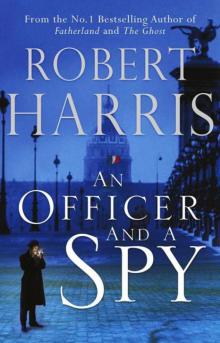 An Officer and a Spy
An Officer and a Spy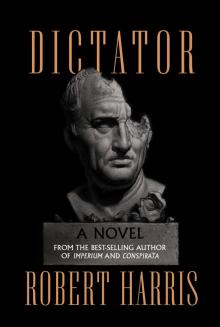 Dictator
Dictator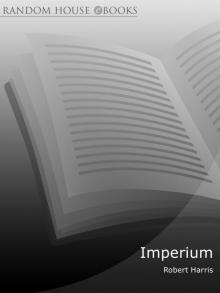 Imperium:
Imperium: Enigma
Enigma Fatherland
Fatherland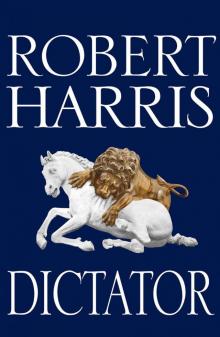 Dictator:
Dictator: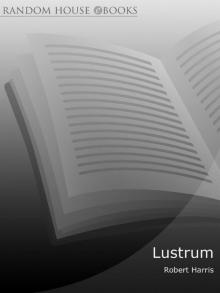 Lustrum
Lustrum Archangel
Archangel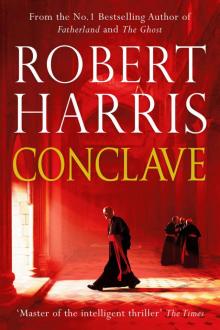 Conclave
Conclave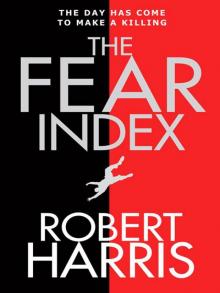 The Fear Index
The Fear Index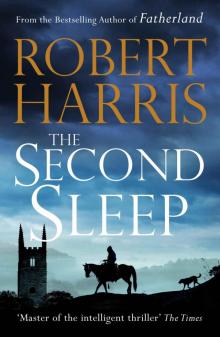 The Second Sleep
The Second Sleep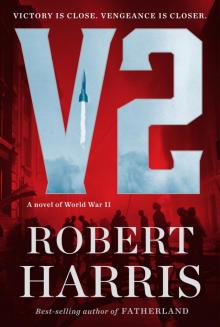 V2
V2 Lustrum c-2
Lustrum c-2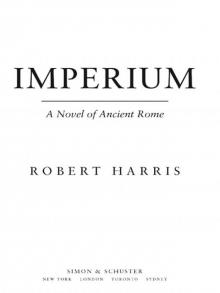 Imperium
Imperium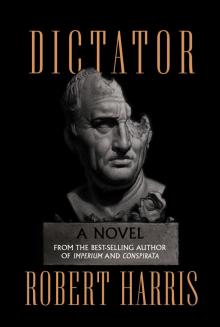 The Dictator
The Dictator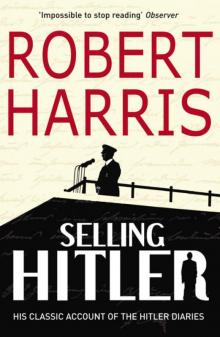 Selling Hitler
Selling Hitler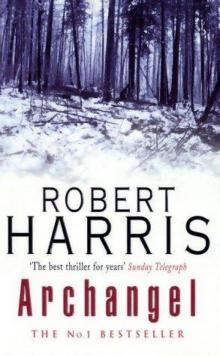 Archangel (Mass Market Paperback)
Archangel (Mass Market Paperback)